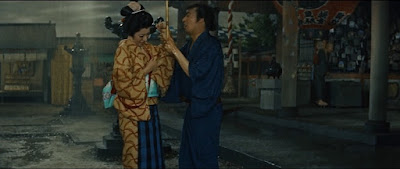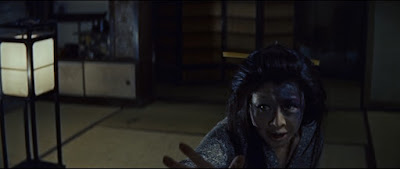Kenji Misumi’s 1959 gothic horror film The Ghost of Yotsuya is one of several film adaptations of a very famous kabuki play. Nobuo Nakagawa’s version came out in the same year so the two versions can easily be confused. There have in fact been countless film, television, manga and anime adaptations.
Iemon Tamiya (Kazuo Hasegawa) is a samurai down on his luck. He cannot find a position. He lacks the connections and the money needed to secure a decent position. He is a proud man but he is almost penniless and heavily in debt. He is basically a good honourable man but he is embittered by poverty and failure. Perhaps that clouds his judgment a little. His wife Oiwa (Yasuko Nakada) is ailing which adds to the pressures and the bitterness.
Iemon has become involved with some disreputable characters. He trusts them, which is a very foolish thing to do.
The loyal family servant Kohei (Jôji Tsurumi) is devoted to Oiwa. He is a good man but his devotion to his mistress may be just a little excessive. He would not think of doing anything dishonourable but his judgment my perhaps also be a bit clouded.
Oiwa’s health is failing. There is a medicine that could cure her but it is very expensive.
Iemon attracts the attention of Oume (Yôko Uraji), the beautiful young daughter of Lord Ito. Oume is in search of a husband. She has chosen Tamiya. The fact that he is already married does not deter her. She is a stubborn girl and she has become obsessed by Tamiya. She must have him.
Oume’s obsession grows. She is tempted to take drastic steps to separate Tamiya from his wife. Oume is headstrong and spoilt and selfish and she is a young girl carried away by love and lust. She might not be evil to begin with but she is vulnerable to temptation.
Iemon’s disreputable friends can see the potential for profiting from this situation.
The stage is set for tragedy.
In gothic horror the aesthetic is everything. If the aesthetic is lacking then any gothic horror film is worthless. The aesthetic is certainly no problem in Ghost of Yotsuya. This is a visually dazzling film. Like any good gothic horror film it was shot entirely in the studio and like any good gothic horror film is has a deliberately and exaggeratedly artificial look. The film was shot in colour so this is not the world of shadows of black-and-white gothic horror. This is a misty world of sickly disturbing colours.
The basis of the story was an 1825 kabuki play although the origins of the story go back much further in time than that.
The various film adaptations differ slightly. In some versions Iemon is much more of an out-and-out villain.
The problem for Daei studio was that Kazuo Hasegawa was a very big star. They were reluctant to have him play a mere villain. In Daei’s version Iemon’s character is softened somewhat. This actually woks quite well. He becomes almost a Shakespearian tragic hero, an Othello manipulated by the true villains. Iemon is no paragon of virtue. He is a bit of a fool. His bitterness has warped his character just a little. He is vulnerable to Oume’s seductive charms. He never becomes evil but his actions are unfortunate and have tragic consequences. And he is aware of his follies and is haunted not just by a ghost but by his own guilt about his cruel behaviour and his foolishness.
We feel some sympathy for him, and we feel a great deal of sympathy for Oiwa. She is not perfect. She is jealous and perhaps not sufficiently understanding of her husband’s frustrations but she is a woman who is horribly wronged.
It takes a long time for the supernatural elements to kick in but since we know that this is a ghost story that becomes quite effective. We can see the tragedy unfolding and we know that the ending will be disastrous.
The Ghost of Yotsuya is classic ghost story and it’s a classic Japanese ghost story that deals with themes of honour and ambition as well as jealousy and emotional betrayal. Highly recommended.
The Radiance Blu-Ray looks gorgeous (and this is a visually stunning movie in a weird fantastic otherworldly way). There are some decent extras.
The Radiance Blu-Ray set also includes the excellent The Snow Woman (1968).





No comments:
Post a Comment